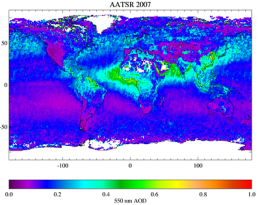Climate studies to benefit from 12 years of satellite aerosol data

Aerosols, very small particles suspended in the air, play an important role in the global climate balance and in regulating climate change. They are one of the greatest sources of uncertainty in climate change models. ESA's GlobAerosol project has been making the most of European satellite capabilities to monitor them.
Using data from the Along Track Scanning Radiometer-2 on the ERS-2 satellite, the Advanced Along Track Scanning Radiometer and the Medium Resolution Imaging Spectrometer on Envisat and the Spinning Enhanced Visible & InfraRed Imager (SEVIRI) instrument on the Meteosat Second Generation, GlobAerosol has produced a global aerosol dataset going back to 1995. The full dataset is available on the GlobAerosol website.
Some aerosols occur naturally, originating from sea-spray, wind-blown dust, volcanic eruptions and biochemical emissions from oceans and forests, while others are produced through emissions from industrial pollution, fossil-fuel burning, man-made forest fires and agriculture.
They are important because they strongly affect Earth's energy balance in two ways: they scatter and absorb sunlight and infrared emission from Earth's surface, and act as condensation nuclei for the formation of cloud droplets. According to the Intergovernmental Panel on Climate Change, these effects tend to cool the planet to almost the same degree as carbon dioxide emissions warm it. These estimates are uncertain, however, so more data are needed.
Satellite data can provide essential information on the global distribution of aerosols to help understand the impact of these processes for the purposes of predicting weather and climate as well as for monitoring the transport of industrial pollution.
To investigate the usefulness of the dataset, pilot studies were carried out by six atmospheric modelling groups from the European Centre for Medium-Range Weather Forecasts, the Laboratoire des Sciences du Climat et l'Environnement, the University of Leeds, the University of Edinburgh, the Max Planck Institute for Meteorology, and the Netherlands Organisation for Applied Scientific Research (TNO). Comparing the satellite data with the model predictions showed differences that helped to highlight deficiencies in both.
Results of the pilot studies were presented during ESA's Atmospheric Science Conference held in Barcelona, Spain, in September. Maria Grazia Frontoso, working on the development of the GLOMAP aerosol model at the University of Leeds in the UK said: "GlobAerosol seems to be a very useful tool to address uncertainties in global models."
Arjo Segers from TNO in the Netherlands compared GlobAerosol data with model predictions of desert dust and forest fires over the Iberian peninsular. "The results of this study suggest that the GlobAerosol SEVIRI dataset is especially useful for investigating aerosol levels over water."
Still, more work is needed to address the problems highlighted in the intercomparison study of the models, and to improve the overall accuracy of the satellite aerosol data. The valuable feedback obtained from the users will help to lay the foundation for the development of more accurate satellite-based aerosol measurements as part of ESA's new Climate Change Initiative.
Source: European Space Agency (news : web)













